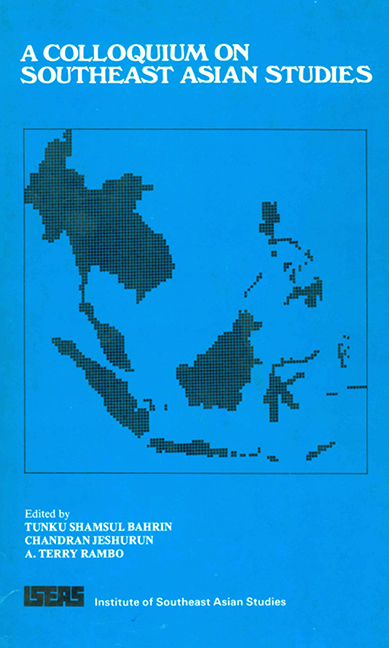Book contents
- Frontmatter
- Contents
- Foreword
- Preface
- Acknowledgements
- Introduction
- Contributors
- PART I TEACHING AND RESEARCH
- THE CONCEPTUAL THEORIES
- 1 Southeast Asian Studies: Problems and Potentialities — East and West
- 2 Southeast Asian Studies: Some Unresolved Problems
- 3 The Challenge of Diversity: Southeast Asian Studies and the Development of Social Science
- THE EXTRAREGIONAL EXPERIENCE
- THE REGIONAL PERSPECTIVE
- THE PROBLEMS OF TEACHING AND RESEARCH
- PART II ENVIRONMENT AND DEVELOPMENT
3 - The Challenge of Diversity: Southeast Asian Studies and the Development of Social Science
from THE CONCEPTUAL THEORIES
Published online by Cambridge University Press: 21 October 2015
- Frontmatter
- Contents
- Foreword
- Preface
- Acknowledgements
- Introduction
- Contributors
- PART I TEACHING AND RESEARCH
- THE CONCEPTUAL THEORIES
- 1 Southeast Asian Studies: Problems and Potentialities — East and West
- 2 Southeast Asian Studies: Some Unresolved Problems
- 3 The Challenge of Diversity: Southeast Asian Studies and the Development of Social Science
- THE EXTRAREGIONAL EXPERIENCE
- THE REGIONAL PERSPECTIVE
- THE PROBLEMS OF TEACHING AND RESEARCH
- PART II ENVIRONMENT AND DEVELOPMENT
Summary
There is hardly any study on Southeast Asia that fails to allude to the extreme social, cultural and political diversity of the area. Often the attention of readers is drawn to the fact that the term “Southeast Asia” was a rather late invention of military leaders to designate a theatre of operations between India and China during World War II. There is, undoubtedly, some unity ranging from a certain “Southeast Asianism” in culture and social organization to a communality of political interest expressed in the formation of ASEAN. But there is no need to deny the obvious diversity in the Southeast Asian region. In fact, this diversity of culture, social structure, economic and political history in the region as a whole, as well as within individual countries, should be recognized and analysed. There is a good reason to follow this line of argument. Confronted by the diversity of Southeast Asia and the startling differences between Southeast Asian societies and their well-known neighbours, particularly India, China and Japan, social scientists had to develop new concepts and new theories to tackle the empirical problems posed by their objects of research. Thus, Boeke used the term “dual organization” for his analysis of colonial Indonesia; Furnivall, contrasting Burma and Indonesia, invented the concept of the “plural society”; Embree coined the term “loosely-structured social system” by contrasting Japanese with Thai rural society; and Geertz brought out his theory of “agricultural involution” after comparing Javanese social development with that of Japan's. All these terms, originally developed in the context of Southeast Asian studies, have found wide acceptance in social research elsewhere and have become standard concepts of textbook social science. Dual Societies As early as 1910 the Dutch scholar and later colonial administrator, J.H. Boeke, expounded his theory of social and economic dualism in his doctoral dissertation.
- Type
- Chapter
- Information
- A Colloquium on Southeast Asian Studies , pp. 28 - 35Publisher: ISEAS–Yusof Ishak InstitutePrint publication year: 1981



